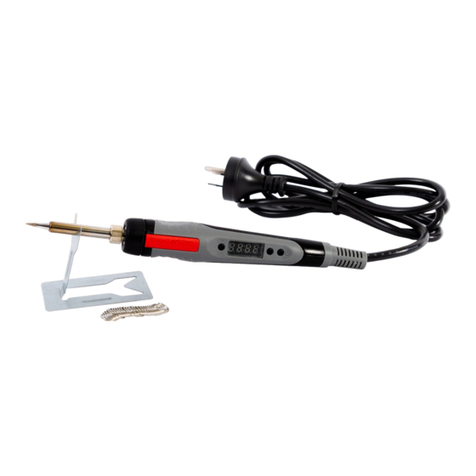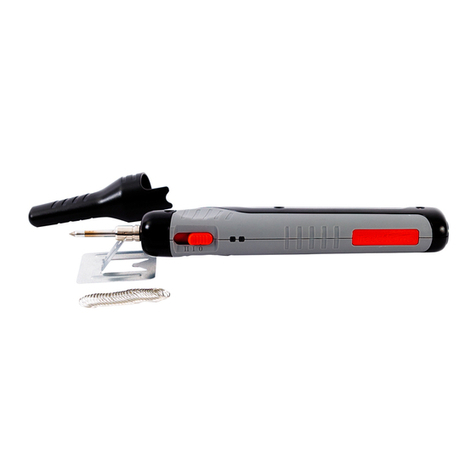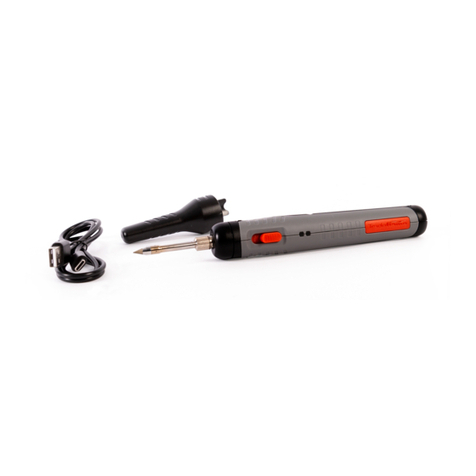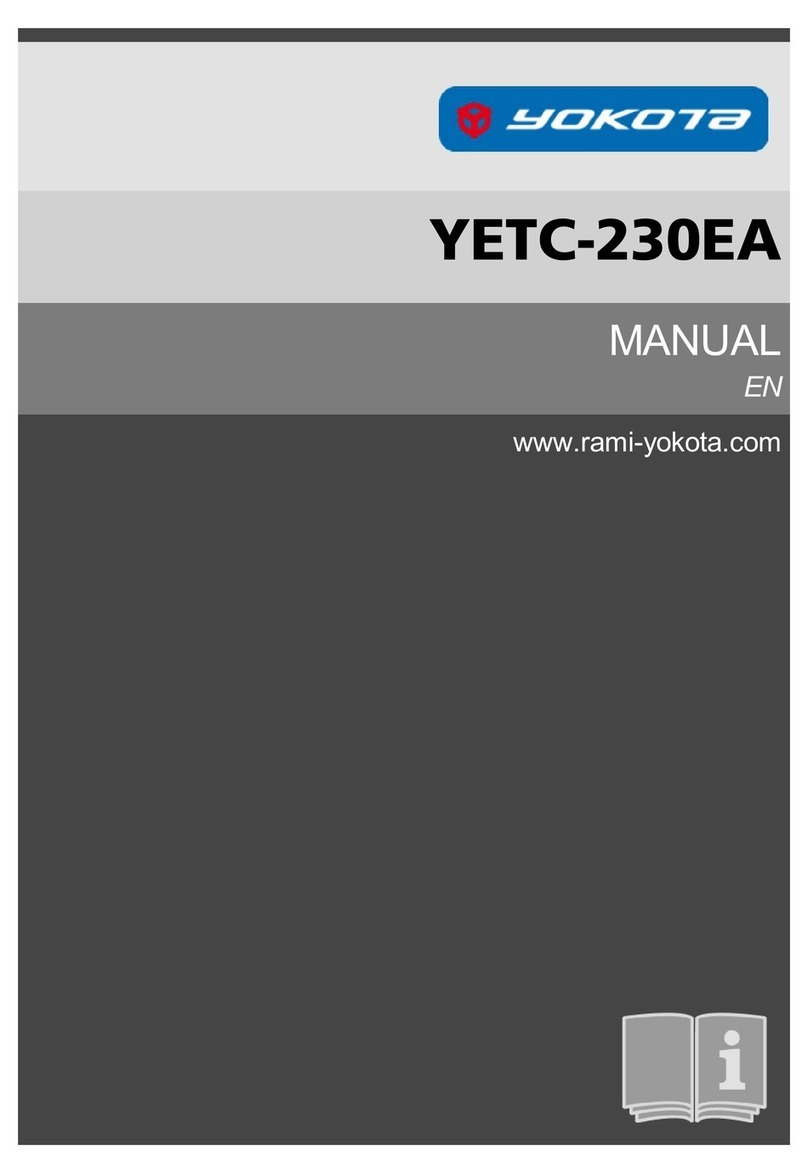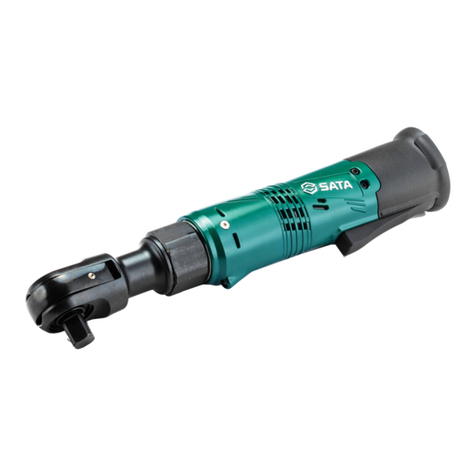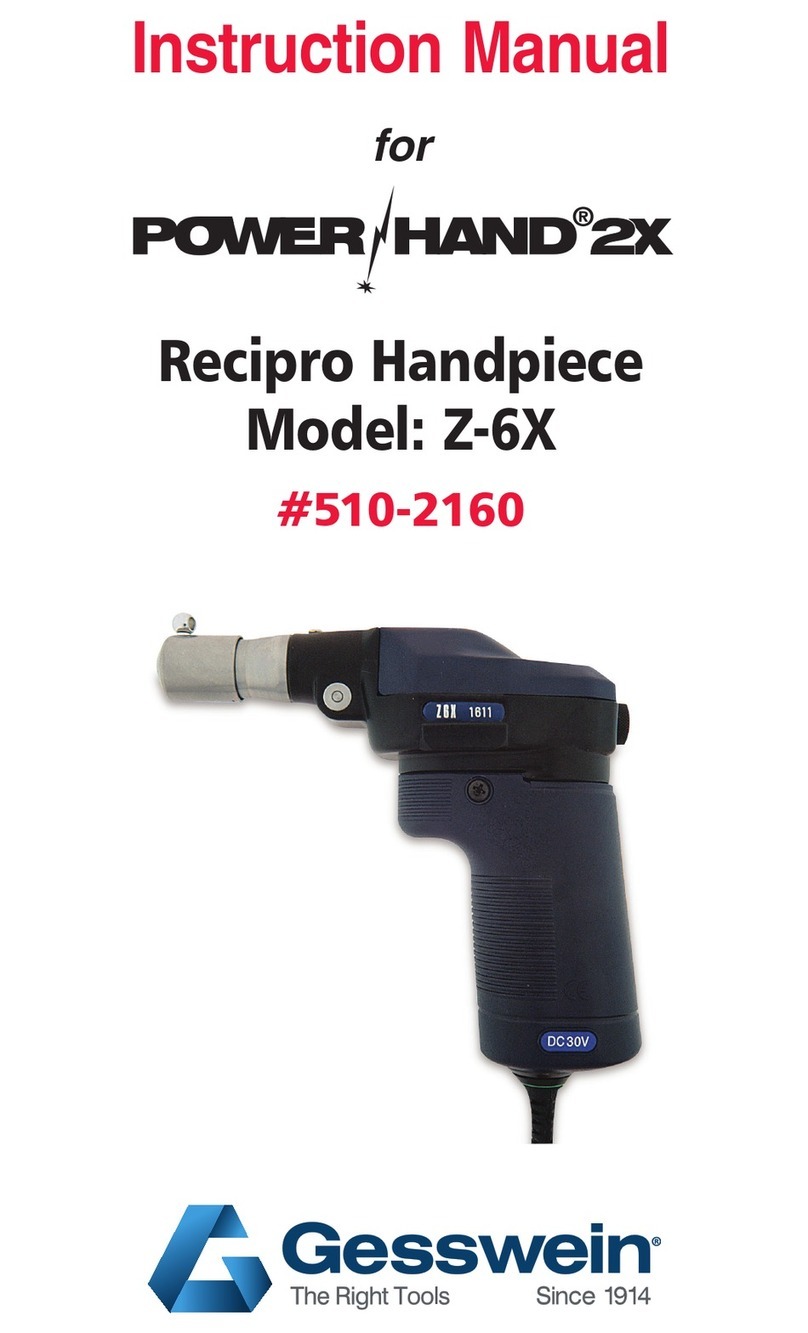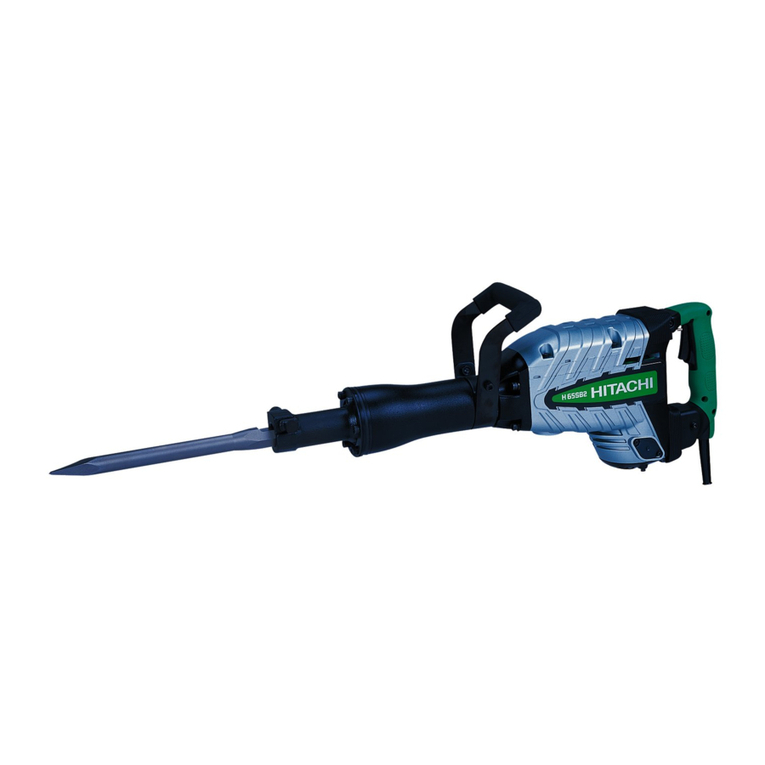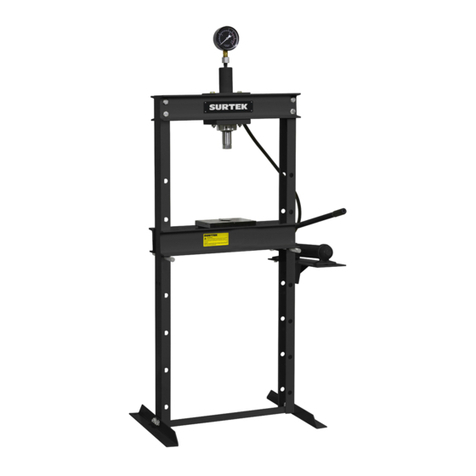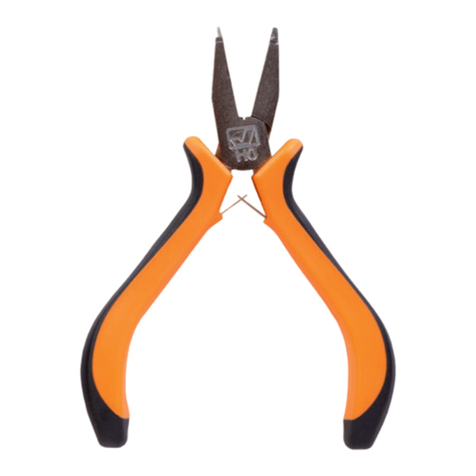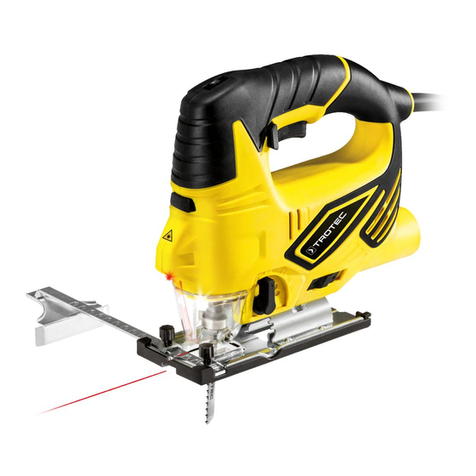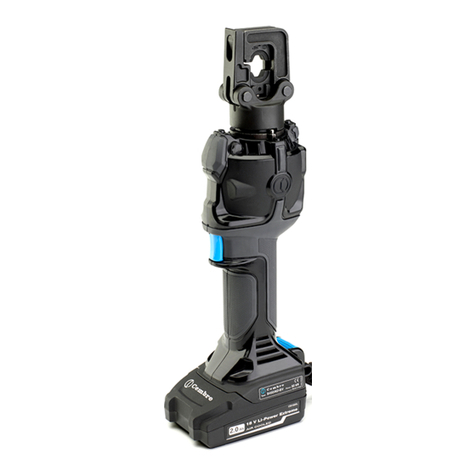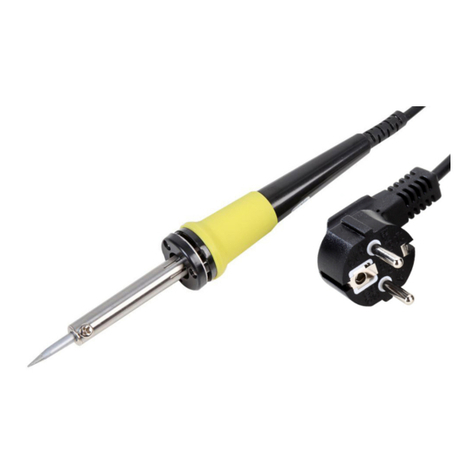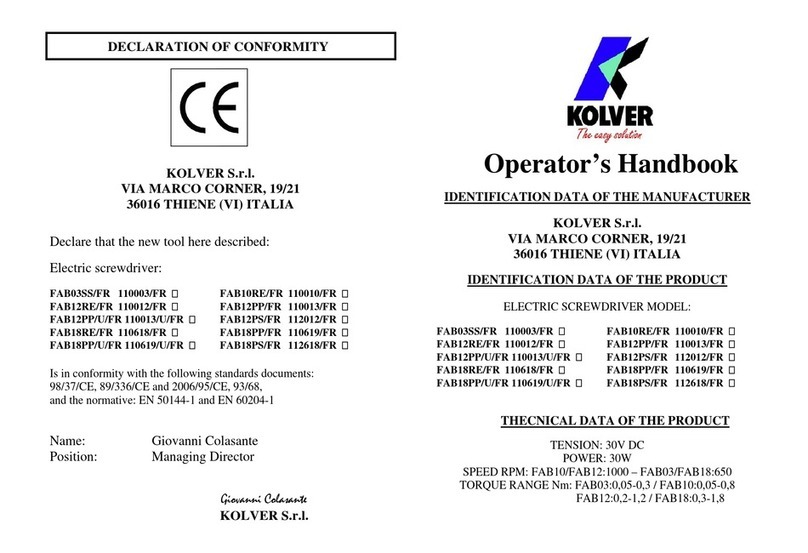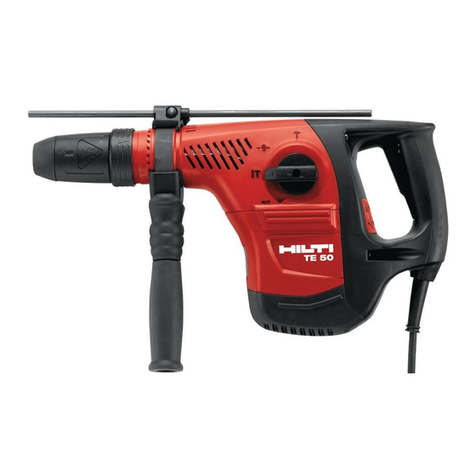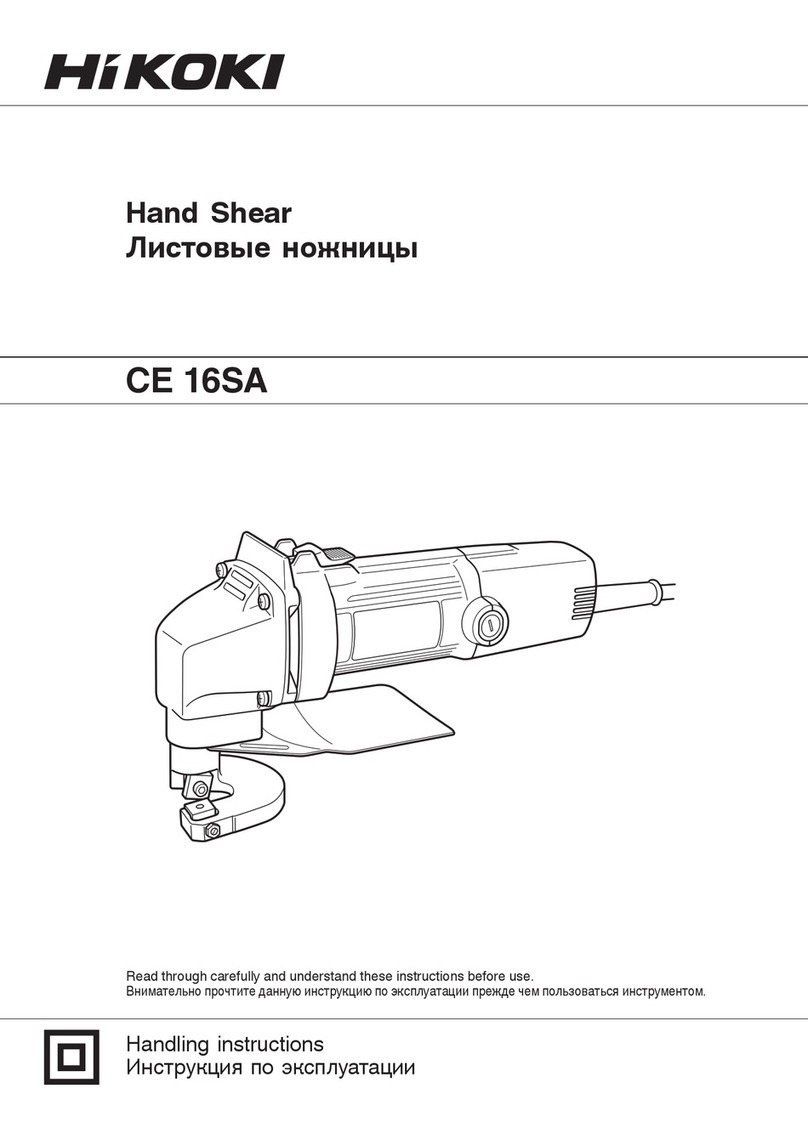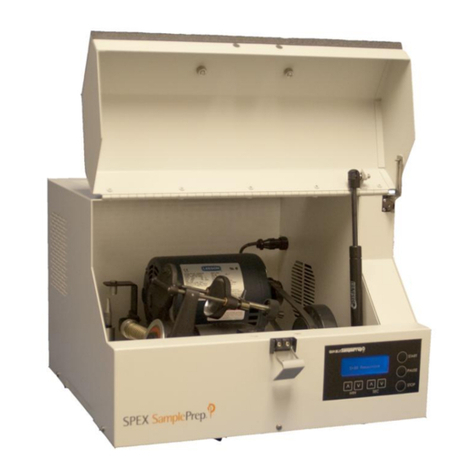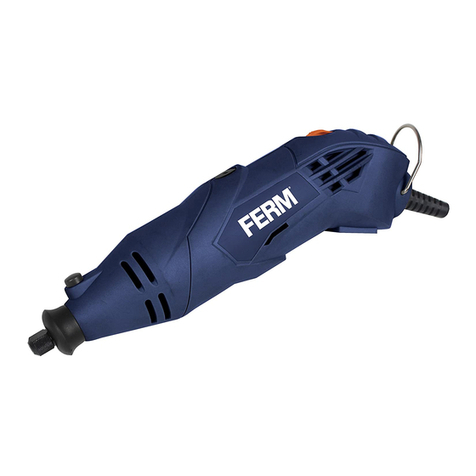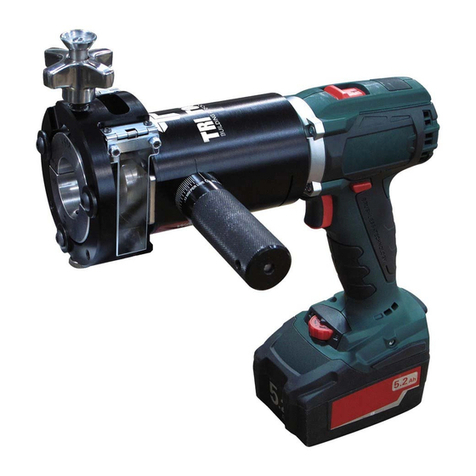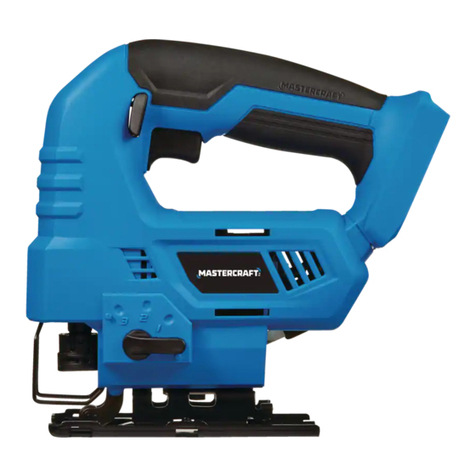Tradeflame 2218189 User manual

30 W ALL IN ONE - De-Soldering Iron
Part No. 2218189
PRODUCT MANUAL
Fig. 1
Fig. 4 - WARNING - hot tip when in use, do not touch, keep De-Soldering
Iron clean and away from oils and lubricants. Do not immerse De-
Soldering Iron in water
Fig. 2 - Correct storage of De-Soldering Iron when not in use Fig. 3 - Do not place in coil holder
Fig. 5 - Do not modify or attempt to repair the De-Soldering Iron except as
indicated in the instructions for use and care.
i. De-Soldering Iron and Pump
ii. Metal stand
iii. Tips
iv. Tip
v. Sharft knob
vi. Release button
vii. Internal plunger
NOTE CONTENTS FOR EACH DE-SOLDERING IRON MIGHT VARY
PLEASE CHECK PACKAGING FOR EXACT DESCRIPTION
viii. Finger guard.

SAFETY WARNINGS
Read all safety warnings, instructions, illustrations and specications
provided with this De-Soldering Iron. Failure to follow all instructions listed
below may result in electric shock, and/or serious injury. Save all warnings and
instructions for future reference. The term “De-Soldering Iron” in the warnings
refers to your mains-operated (corded) De-Soldering Irons or battery-operated
(cordless) De-Soldering Irons.
WORK AREA SAFETY
zKeep work area clean and well lit. Cluttered or dark areas invite accidents.
zDo not operate De-Soldering Iron in explosive atmo-liquids, gases or dust.
De-Soldering Irons create sparks which may ignite the dust or fumes.
zKeep children and bystanders away while operating
ELECTRICAL SAFETY
zIndoor use. Do not expose De-Soldering Iron to rain or wet conditions.
Water entering a De-Soldering Iron will increase the risk of electric shock
(Fig. 4)
PERSONAL SAFETY
zStay alert, watch what you are doing and use common sense when operating
a De-Soldering Iron. Do not use a De-Soldering Iron while you are tired/
distracted or under the inuence. A moment of inattention while operating a
De-Soldering Iron may result in serious personal injury.
zUse personal protective equipment. Always wear eye protection. Protective
equipment such as a dust mask, non-skid safety shoes, hard hat or hearing
protection used for appropriate conditions will reduce personal injuries.
zPrevent unintentional starting. Ensure the switch is in the off position
before connecting to power source, picking up or carrying the De-
Soldering Iron.
zDo not overreach. Keep proper footing and balance at all times. This enables
better control of the De-Soldering Iron in unexpected situations.
zDress properly. Do not wear loose clothing or jewellery. Keep your hair and
clothing away from moving parts. Loose clothes, jewellery or long hair
can be caught in moving parts.
zDo not let familiarity gained from frequent use of the De-Soldering Irons
allow you to become complacent and ignore De-Soldering Iron safety
principles. A careless action can cause severe injury within a fraction of a
second.
DE-SOLDERING USE AND CARE
zDo not force the De-Soldering Iron. Use the correct De-Soldering Iron for
your application. The correct De-Soldering Iron will do the job better and
safer at the rate for which it was designed.
zDo not use the De-Soldering Iron if the switch does not turn it on and off. Any
De-Soldering Iron that cannot be controlled with the switch is dangerous and
must be replaced.
zDisconnect the plug from the power source and/or turn off the battery, from
the De-Soldering Iron before making any adjustments, changing accessories,
or storing De-Soldering Iron. Such preventive safety measures reduce the
risk of starting the De-Soldering Iron accidentally.
zStore idle De-Soldering Iron out of the reach of children and do not allow
persons unfamiliar with the De-Soldering Iron or these instructions to
operate the De-Soldering Iron. De-Soldering Iron are dangerous in the hands
of untrained users.
zMaintain De-Soldering Iron and accessories. Check for misalignment or
binding of moving parts, breakage of parts and any other condition that may
affect the De-Soldering Iron’s operation. If damaged, have the De-Soldering
Iron repaired before use. Many accidents are caused by poorly maintained
De-Soldering Iron.
zUse the De-Soldering Iron, accessories and De-Soldering Iron bits etc.
in accordance with these instructions, taking into account the working
conditions and the work to be performed. Use of the De-Soldering Iron
for operations different from those intended could result in a hazardous
situation.
zKeep handles and grasping surfaces dry, clean and free from oil and grease.
(Fig. 4) Slippery handles and grasping surfaces do not allow for safe handling
and control of the De-Soldering Iron in unexpected situations.
zDo not expose a De-Soldering Iron to re or excessive temperature.
Exposure to re or temperature above 130°C (265°F) may cause explosion.
SPECIFIC SAFETY RULES FOR DE-SOLDERING IRONS
zContact with a hot tip could ignite ammable materials. Contact with a hot
tip could ignite a re.
zWhile in use do not stand or store De-Soldering Iron on its side. De-Soldering
Iron could tip resulting in contact between hot tip and ammable materials.
Always set/store De-Soldering Iron on metal stand provided (Fig. 2)
zDo not place De-Soldering Iron in coil stand (Fig. 3).
zKeep hands clear of the tip serious burns can occur if skin contacts tip
(Fig. 4)
zWork in well ventilated areas. De-Soldering can produce fumes and smoke.
zUse personal protective equipment when using
zThis De-Soldering Iron is not intended for use by persons (including children)
with reduced physical, sensory or mental capabilities, or lack of experience
and knowledge, unless they have been given supervision or instruction
concerning use of the appliance by a person responsible for their safety.
KEEP AWAY FROM CHILDREN
zTo reduce the risk of re, personal injury, and product damage due to a short
circuit, never immerse your De-Soldering Iron, battery pack or charger in
uid or allow a uid to ow inside them. Corrosive or conductive uids, such
as seawater, certain industrial chemicals, and bleach or bleach-containing
products, etc., can cause a short circuit. (Fig. 4)
zTo reduce the risk of injury, always wear safety goggles or glasses with side
shields. Keep hands and ngers behind nger guard (Fig.1 / vii). Serious
burns could occur if skin contacts a hot tip.(Fig. 4)
ACCESSORIES
Use only recommended accessories. Others may be hazardous.
For a complete listing of accessories, go online to www.tradeame.com

CHANGING THE SOLDERING TIP
Ensure the tip is cool and De-Soldering Iron is switched off and unplugged from
mains current before touching the tip as serious burns could occur to skin if
touched.
1. Unscrew the tip in a anti clockwise movement.(Fig. 6)
2. Remove the tip and replace. (Fig. 7)
3. Tighten the tip securely with a clockwise movement. (Fig. 6)
SOLDERING HINTS
zRe-tin the tip (cover the heated tip with solder) prior to use.
zUse the De-Soldering Iron to heat the work items and apply solder directly to
the work items – not to the De-Soldering Iron tip.
zClean the tip with a damp sponge or Tradeame’s Brass Tip Cleaning brass
wire (part number: 218167). after use – do not le tip.
zUse the metal stand when De-Soldering Iron is not in use
OPERATING
1. Prepare the work area and piece
2. Ensure the De-Soldering Iron tip and work items are clean.
3. Make sure De-Soldering Iron tip is xed in position andsecure. (Fig. 6 & 7)
4. Insert the pump tube into the tool with the release button facing out
5. Connect De-Soldering Iron to mains current and place on the metal stand
provided (Fig. 2).
6. Let the tool rest on the safety stand provided and wait for 5 minutes for the
tool to reach working temperature
7. Reverse the PCBA so that the terminal leads are facing up and secure the
PCBA on a steady surface for easier operation
8. Push down the shaft knob (Fig. 1 / v) of the pump with your thumb all the
way down until it clicks
9. Hold the De-Soldering Irons with your thumb over the release button
(Fig. 1 / vi)
10. Position the hot tip directly over the soldering point for a few seconds to
melt the solder around that connection
11. Once you see the molten solder, press the release button to suck up the
molten solder
12. If there is still residue solder at the connection point, repeat steps
13. Move on to the next connection point until the component can be freed
14. Be careful not to overheat the board and/or any heat sensitive components
15. Allow the joint to cool undisturbed.
16. To turn off the De-Soldering Iron at the mains current.
17. While still hot, clean the tip with a lightly damp sponge or Tradeame’s
Brass Tip Cleaning Brass Wire (Part Number: 218167).
WARNING! Avoid contact, tip is hot and could cause serious burns.
18. Place De-Soldering Iron on Metal Stand provided on its side with the tip
away from working area (Fig. 2)
19. Turn the mains current off and unplug the De-Soldering Iron.
20. Let the De-Soldering Iron to cool down naturally
21. Once tip has cooled store is a safe and dry space.
MAINTENANCE
CLEANING PIN
zMolten solder can cool down quickly inside the metal barrel causing
obstruction.
zAfter each use, unplug the tool, hold the tool with tip facing upwards, then
use the cleaning pin provided to clear out the internal pathway by inserting
the pin through the tip hole and push away solder residue
zSlide the cleaning pin back into the main body of the tool for storage
DE-SOLDERING TIP
zThe tips are made with iron-plated copper with good heat conduction for
faster heat transfer
zAlways clean the tip with solder tip cleaning brass wire or damp spongeafter
each use
SUCTION PUMP
To empty solder residue from the suction pump, remove the suction pump from
the main body, screw open the end caps and empty the solder residue
Fig. 7
Fig. 6
Distributed by
TRADEPEM INDUSTRIAL PTY LTD.
Other Tradeflame Power Tools manuals
